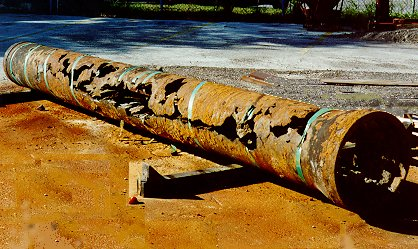 Menu
Menu
Typical Physical Properties of Crude Oil Line Corrosion Inhibitors
High quality, high film, batch type crude oil line corrosion inhibitor specifically designed to control corrosion of oil in petroleum production plants. Description RIM 101* a unique combination of hydro-acoustic, Corrosion Inhibitors, and Surfactants amines in an acousmeric base solvent. This anti-corrosive product has low solubility in water and oil. This oil corrosion inhibitors form a highly persistent corrosion inhibitor coat on down hole machines, flow lines, and other oil handling equipment.
This crude oil line corrosion inhibitor is also used as a film forming product use high film, high pressure and temperature amine film forming salts. It is formulated with the aid of sodium hypochlorite and magnesium sulfate. The product use high pressure and temperature amine film forming salts that form a hard, rigid film when mixed with a carrier solution. This coating provides a highly effective corrosion protection for pipes and pipelines against oil drips and leaks.
Crude oilfield equipment and supplies are vulnerable to a wide range of hazardous chemicals. This includes corrosive oils, hydrocarbons, and hydrocarbons containing sulfur which can significantly damage or even destroy machinery. Safety is priority in any industry and the use of oilfield corrosion inhibitors that protect machinery from these chemicals is essential. Using an anti-corrosive material that protects against chemicals while allowing the flow of air and other hazardous materials is necessary. The application of a stringent chemical-free anti-rusting additive is often the only means of protecting equipment from corrosion.

An anti-corrosive additive commonly applied to petroleum and coal production and other mineral processing plants is calcium bromide. Calcium bromide is used as a crude oil line corrosion inhibitor by many pipeline and drilling fluids producers and pumping services as well as the oil and gas and petrochemical industries. The chemical compound has been found to be exceptionally effective in combating the growth of rust at various points in the pipe or tubing. These applications include hot metal pipes used in hydraulic systems, oil drum lines, saltwater pore opening contacts, valves, and in-house heating systems such as boilers, freezers, and water heaters.
Crude oilfield chemicals applications include the calcium bromide salt solution, which is combined with a binder and additives to form a hard, thick crystal. Other compound solutions include magnesium sulfate and potassium phosphate. A crude oil demulsifier is a complex mixture of chemicals used to reduce the concentration of chloride, sulfuric acid, and organic acid in aqueous solutions. These compounds are mixed with the proper amount of water and then injected or sprayed into pipeline or wellbore cracks. The goal is to decrease the amount of hydrocarbons and organic chemicals that find their way into an operator's system.
An effective crude oilline corrosion inhibitor will offer an effective barrier against hydrocarbons, which causes a great deal of damage to plant equipment. Some products offer the ability to prevent corrosion in other types of material, which increases plant efficiency and reduces maintenance costs. These compounds also have the ability to prevent cracking and other pipeline deterioration by binding with other substances in the pipeline. A pipeline corrosion inhibitor should be formulated to meet the typical physical properties of the material being protected, and should also have the ability to increase corrosion resistance and resist heat, which makes it a very important component of any effective oilfield safety management system.
